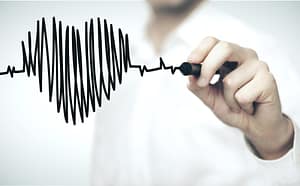Unfortunately, anxiety is one of the most common mental illnesses suffered by millions of people around the world. For those who are unable to feel the effects of prescribed medication and therapy, there has been a growing interest in alternative therapy, such as biomagnetic. Let’s uncover how biomagnetism works to overcome anxiety issues and why it’s emerging as a trusted therapy for managing various health issues.
What Exactly is Anxiety?
Anxiety can be rather complex; it is not simply being stressed or being worried about something. Instead, it is a multifaceted disorder that involves an excess of fear, feeling restless, and feeling that something will turn out bad. One can observe changes in one’s body as well, such as faster heart rate, headache, tense muscles, and even problems with digestion.
Anxiety, whether we like it or not, is one of the most common mental health conditions that is prevalent across the globe; research shows that, on average, every third of adult suffer from shortness of breath at least once in their lives. This shows the increasing use of anti-anxiety medications, which are often seen as helpful treatment options. However, these medications can cause side effects like drowsiness and dizziness. Because of this, many people are looking for alternative therapies, such as biomagnetism, which offers a more natural and holistic way to manage rapid hartbeat.
Symptoms of Anxiety: How to recognize them
Everyone demonstrates shortness of breath symptoms, but since symptoms can be of three types: physical, emotional, and behavioral, It is important to consider its signs with great regard. This knowledge can also assist in the early intervention of the condition and getting the requisite support.
Physical Symptoms:
- Palpitations or a fast heart rate.
- Hyperventilation or labored short breaths.
- Clenching” of the muscles surrounding the shoulder girdle and neck area.
- Migraines.
- IBS or constant urge to vomit coupled with heartburn.
- The buildup of sweat, tremors, and shivers.
- Being fatigued after not much effort or movement.
Emotional Symptoms:
- Overall anxiety, which includes ominous concerns or recurring worse-case scenarios. Heightened feelings of annoyance and sensitivity and sudden shifts in emotions.
- Inability to remain focused on a task. Mild or severe sense of losing control of an unfavorable situation.
- Engaging in overthinking and even obsession with unimportant circumstances.
Behavioral Symptoms:
- Avoiding certain individuals, circumstances, or even conflicts because they might cause rapid heartbeat attacks. Putting tasks aside or even facing struggles deciding even little tasks.
- A strong will of reliance on drugs that contain alcohol or caffeine.
- Difficulty in falling or maintaining a deep sleep cycle.
- Feeling too hungry for nothing or losing the appetite.
It is important to understand that these signs should be targeted and treated through specific means.
Causes of Anxiety: What keeps them up at night
Usually, a mix of biological traits, a mental state, and also certain events that happen within the environment enables people to develop anxiety; as earlier stated, understanding these causes is of great importance.
Biological Causes:
- Genetics: Rapid heartbeat disorders often show incidence between family members, which suggests a genetic cause.
- Brain Chemistry: Suffering or potential effects of anxiety are linked to deficiencies or changes in neurotransmitter balance, such as serotonin, dopamine, and GABA.
- Hormonal Changes: At times, in life events such as the menstrual cycle, childbirth, or menopause, hormone levels rise and fall, some of which may provoke anxiety.
Psychological Causes:
- Past Trauma: Issues of neglect, abuse, or any major traumatic life occurrences in childhood could result in anxiety during late adulthood.
- Personality Traits: Anxiety also appears to be linked with perfectionism and lack of self-esteem, as well as being overly sensitive to averting criticism.
- Learned Behavior: Children raised in settings filled with anxiety and worrying may become accustomed to anxious behavior themselves.
What is Biomagnetism?
Biomagnetism operates on the principle that health is optimal when the body’s local pH levels are balanced. Imbalances in pH can lead to various health challenges, and bio-magnetism helps correct these by balancing the local pH in specific organs and tissues, restoring internal stability, and encouraging natural healing processes. This drug-free, painless, and non-invasive therapy can be a game-changer for holistic wellness, supporting the body’s self-regulation and enhancing overall health.
Read this article for more information of Biomagnetic Adjustment Therapy

How Biomagnetism Manages Anxiety?
Although anxiety can be defined as principally a mental health issue, it can be argued that the mind and the body are interconnected and thus consider physical injuries as well. It has been proven in studies that chronic anxiety and stress change the biochemistry of the body, and the results include:
Acidic pH levels: Over time, stress increases the level of cortisol, weakening the body’s pH and creating an acidic environment within the body, which harms the body instead.
Disrupted energy flow: Anxious patients experience breathing difficulty, and that translates into electromagnetic energy around the worry’s body, leading to blockages and acne scars.
Inflammation: Higher stress levels can cause inflammation, which is linked to several mental and physical disorders.
Biomagnetism addresses these underlying imbalances by neutralizing pH levels, reducing inflammation, and improving the body’s natural energy flow. This creates an environment conducive to emotional stability and physical healing.
Benefits of Biomagnetism for Anxiety
Naturally Non-Invasive: Unlike medication, biomagnetic therapy is entirely non-intrusive and devoid of chemicals or any sort of synthetic incorporation. It trains in line with the body’s self-healing abilities.
Zero Side Effects: The therapy does not have any side effects, which makes this ideal for all types of patients, including those who are hypersensitive to regular courses of therapy.
Diverse Strategy: Bio-magnetism goes beyond just masking the symptoms but also deals with the factors that bring anxiety, thus bringing about permanent relief to the patients.
Promotes General Well-being: Besides relieving anxiety, biomagnetic also enhances digestion, immunity, and energy levels, thereby promoting general well-being.
Biomagnetism is the best approach for people who are struggling with anxiety in a society that oftentimes seeks the quickest of solutions. The therapy promotes both physical and emotional wellness by managing the body’s imbalances. Supporting the everyday life of a person, whether or not biomagnetic is the only course taken, the point is that it amplifies the person’s ability to steer his emotions. For people who are constantly plagued by anxiety and are finding it hard to find a comfortable solution, biomagnetic therapy is the answer. The society is pushing this therapy due to its positive recognition and results.
Continue Reading : Biomagnetic Acupoint Therapy




